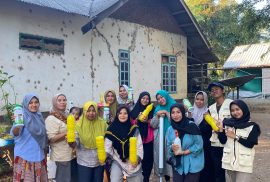An environmentally friendly technology-based empowerment program has been successfully carried out by Agricultural Microbiology student of the 2022 cohort, Elnadya Karina Cahya Murti, over a period of 50 days to optimize the abundant local resources. Elnadya was accompanied by the KKN-PPM Junjung Pulau Besar team, Period II of 2025, in Sumber Jaya Permai Village, South Bangka Regency, Bangka Belitung Islands.
To enhance sustainable agricultural and livestock productivity, Elnadya focused her program on the application of microbiological knowledge. The work programs included producing cocopeat planting media from coconut husk waste through microbial fermentation, education and application of mycorrhizal propagules on corn seeds, and the utilization of briquettes made from cattle manure as an alternative energy source.
The program was implemented through a participatory approach, directly involving local farmer and livestock groups. Farmers of Sumber Jaya Permai Village were guided through hands-on demonstrations and received intensive assistance in applying microbe-based technologies. Both farmer and livestock groups warmly welcomed the program, showing strong interest in integrating environmentally friendly and sustainable agricultural and livestock practices. Farmers and breeders were able to experience firsthand the benefits of diversifying their agricultural and livestock products.
Theoretically, this program validates the idea of synergy between microbiology and the concept of sustainable agriculture. According to Elnadya, microorganisms play an important role in the fermentation of cattle manure into high-quality briquettes, the mycorrhizal symbiosis that enhances phosphorus absorption efficiency in corn plants, and the decomposition of coconut husks into cocopeat growing media enriched with beneficial microbes.
Furthermore, the KKN-PPM Junjung Pulau Besar program, supervised by Prof. Ir. Panjono, S.Pt., MP., Ph.D., IPM., ASEAN Eng., represents active student participation in supporting the Sustainable Development Goals (SDGs), particularly SDG 2 (Zero Hunger), SDG 7 (Affordable and Clean Energy), SDG 8 (Decent Work and Economic Growth), SDG 12 (Responsible Consumption and Production), SDG 13 (Climate Action), and SDG 15 (Life on Land).
The community of Sumber Jaya Permai Village has gained significant benefits from this environmentally friendly technology-based empowerment program. The program’s success was supported by the contribution of KKN team members, the village administration, and the enthusiastic participation of the community in adopting eco-friendly technologies. This initiative serves as a sustainable community empowerment model that can be replicated in other villages across South Bangka.




